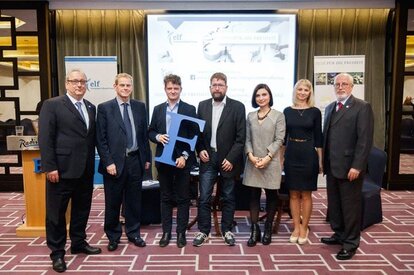Facing up to the Challenges for Media Freedom and Media Pluralism in ESEE

Participants in the Panel Discussion and Organizers from ELF and FNF ESEE
An open and free media landscape with divergent, independent views and ideas is key for democratic and pluralistic societies. However, there are tendencies of limitation of media freedom and pluralism in the countries from East and Southeast Europe, regardless of their EU membership status. It looks as if there are many cases where the media is semi-free, trapped between being free and subjugated to censorship.
Media representatives, experts and policy makers from Bulgaria, Romania, Western Balkans, Ukraine, Russia, Hungary, Georgia and Turkey met in Sofia to discuss the underlying causes, evaluate tools of strengthening media independency through the exchange of best practices.
The event was organised by the European Liberal Forum (ELF), supported by the Regional office for East and Southeast Europe of the Friedrich Naumann Foundation for Freedom (FNF ESEE), with the assistance of Association of European Journalists-Bulgaria, the Republikon institute (Hungary), the Magma (Finland), the Swedish International Liberal Centre (SILC) (Sweden) and the Centre for Liberal Studies (Czech Republic).
The first part of the event was an open forum, which gathered journalists, media experts, policy makers and political analysts. Dr Jurgen Martens, Vice President of the ELF, and Dr Rainer Adam, Regional Director of FNF ESEE opened up the event. Mr William Horsley, Vice-President of the Association of European Journalists, delivered a keynote speech on actual situation of the media freedom in East and Southeast Europe. According to him in East and Southeast Europe we see a very disturbing pattern of governments, almost everywhere, stepping back from the basic rules of democracy and the rule of law. What needs to be done is that the countries should go back to the rules that they have committed to. Particularly, the European Convention on Human Rights. The European Court of Human Rights has an excellent framework of legal protections, not just for journalists, but for human rights, generally. And the way, this is now being ignored or trampled on is very dangerous for Europe, as a whole. “Media freedom for me is being able to scrutinize those in power without fear of reprisals and actually exercising that right. And having that accepted by the politicians. And if there is a dispute, an independent process to judge between the two”, shared Mr Horsley.
You can find part 1 of the photos here:
In the following panel discussion Ms Ulyana Kondratenko, Editor in Chief of the online edition of the newspaper "Dserkalo Tyzhnia” in Ukraine, Ms Vildan Ay, Founder and Manager of Poltio Turkey, Ms Kristina Hristova, President of the Association of European Journalists-Bulgaria and Dr Csaba Tóth, Director of Strategy by the Republikon Institute in Hungary deliberated on the current challenges and limitations by the freedom of the media in their respective countries.
Dr Csaba Tóth reported about the current political situation in Hungary and outlined five ways how it controls the media. Firstly, a series of changes in media regulation have brought about to self-censorship and to fear among journalists that they can be sued for publishing “delicate information” or “attacking a politician”. Secondly, many private media channels, which rely on the free information of the state press agency, are subjected indirectly to the state propaganda. The third avenue is the so-called “state capture” phenomenon, where the private interests influence largely the decision- and policy-making processes in the country. Furthermore, the state has direct control over a significant part of the population through the state radio and television channels. Around half of the population in Hungary do not follow social media and rely heavily on traditional media, which is under the government’s control. Last, but not least, the state uses consistently all the online and offline media, under its control, to attack its opponents.
After an engaging question and answer session of the panel discussion, the launch of the book "Hello, Dictator" took place. The book, project of the Swedish International Liberal Centre (SILC), is an anthology on the situation for democracy and freedom of the media in Hungary under Viktor Orbán. Mr Ulf Schyldt, local politician, freelance consultant and editor, presented the book. Furthermore, Dr Tóth commented on the political reality in Hungary.
The second part of the event, a two-day workshop, was focused on the gap between good and bad performing countries, on the special cases of media abuse and on the possibilities to use the new media and the social networks in the struggle against the limitation on media freedom and pluralism in East and Southeast Europe. The discussions focused on the following three topics: Can Independent Websites Combat Political and Economic Repression?; The NGO Media Models as Platforms for Independent Investigations: Opportunities and Obstacles; How to deal with Hate Speech Online?.
At the end of the workshop the participants, media representatives, experts and policy makers, agreed upon a common Call for Action for free and independent media in East and Southeast Europe, which will be presented to the media and professional audience in the region and in Europe, in order to gather supporters.
Please find here the Call for Action.
You can find part 2 of the photos here:
For more information you can visi t the European Youth Forum website Link to website and Facebook page Link to Facebook .